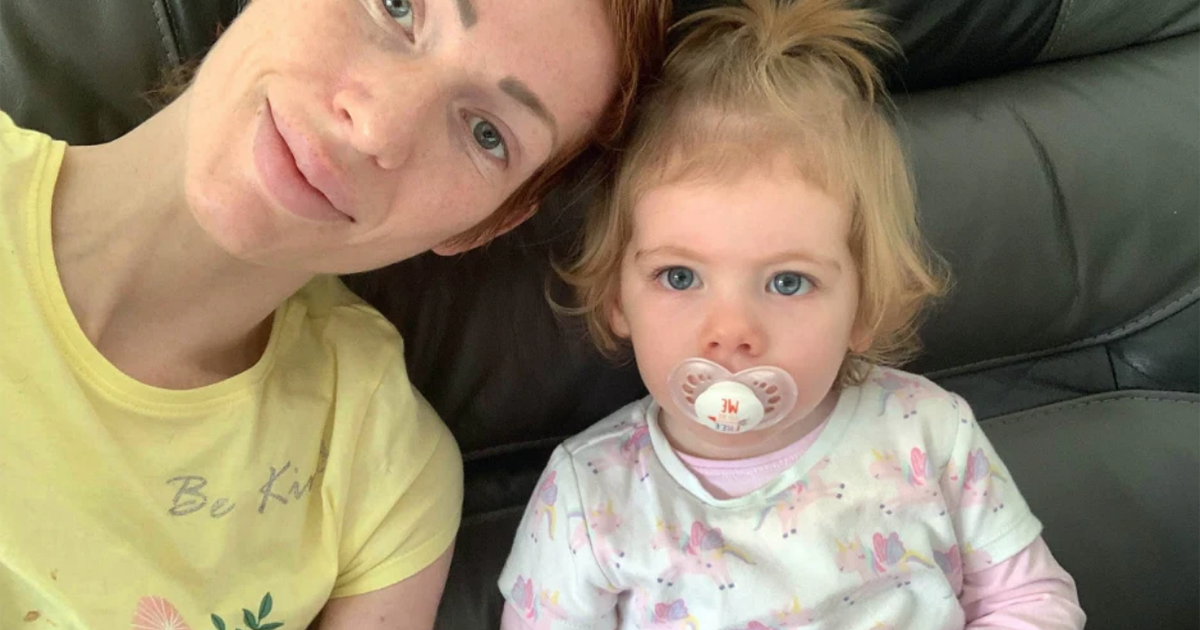When Ovarian Cancer Comes Back
- A 27-year-old mother whose ovarian cancer recently returned is determined to see her daughter's second birthday.
- Estelle Wignall was first diagnosed with ovarian cancer at just 22 years old. She beat the disease, but found out last year that the cancer had returned. This time, it was stage 4.
- The majority of women who are diagnosed with ovarian cancer will go into remission, but about 80% of those women will have a recurrence within the next five years. However, there are exciting new treatment options available to women with recurrent ovarian cancer.
Toward the end of 2020, Estelle Wignall was planning to have a hysterectomy a surgical procedure to remove the uterus so there was "no chance the cancer could return."
Read More"I was devastated," she says. "The first time I had cancer, I coped well. But this time, because of Brooke, I was heartbroken. She was just six months old and it felt so cruel."
Wignall was told she had between two and three years left to live. However, her prognosis improved after treatment (the type of treatment is unknown).

But Wignall and her husband, Mike, were recently given the heartbreaking news that her cancer had one again spread; this time, the disease made its way to her bowel. Wignall is now being told her time is "running out."
"I've been on the brink before and I have bounced back and I am determined to do it again," she says. "I can't give up; I have too much to live for, and I am determined to look for treatment abroad."
"I want to celebrate my little girl's second birthday," she adds. "I want to see her start school (and) I want to mark as many milestones as I can."
Estelle's Cancer Diagnosis
Five years ago, when Wignall was 22 years old, she began to experience tiredness and bloating. She made an appointment with her doctor, who insisted she had irritable bowel syndrome, also known as IBS.
Her symptoms became so worrisome that she was rushed to a nearby hospital, but again, she was sent home with medication.
"I picked up a leaflet in hospital about ovarian cancer and I immediately diagnosed myself," she says. "Everyone told me not to be so stupid because I was only 22 years old. People said I was being a hypochondriac. Nobody took me seriously, but I just knew. It was an instinct."
Here at SurvivorNet, we always advise patients to be their own advocate when navigating the medical world; no one knows your body better than you. Wignall is a perfect example of this because her instinct was right.
Advocating for Yourself While Navigating the Medical World
She advocated for herself, pushing for tests to be done to confirm what she already knew. And in February 2017, she was diagnosed with stage 1 ovarian cancer.
Luckily, it was caught early; she had a tumor removed, as well as her right ovary and fallopian tube. She thankfully made a full recovery and went on to give birth to her daughter, Brooke, just a few years later.
"I had only one ovary," she says, "so to conceive so quickly felt like a miracle."
Now, she is fighting an ovarian cancer occurrence, something that, unfortunately, happens all too often.
When Ovarian Cancer Comes Back
The majority of women who are diagnosed with ovarian cancer will go into remission.
However, about 80% of those women will have a recurrence within the next five years, according to Dr. Beth Karlan, a gynecologic oncologist at UCLA Health.
Recurrence often occurs because some cancer cells are left behind after treatment, and, over time, they grow larger. The cancer may have specific features which means these cells just did not respond well to treatment.
Dealing With Recurrence in Ovarian Cancer
"We treat patients whose ovarian cancer has come back three, four, five, six, seven and eight times," Dr. Karlan tells SurvivorNet. "And often, despite it being their fifth or sixth recurrence, (the treatments) seem to … get them back into remission."
How does that happen? Dr. Karlan explains that it is a "careful analysis of what they've been through before, how long since some of their last treatments and also an analysis of their tumors."
While the probability of recurrence is, without question, daunting, there are exciting new treatment options available to women with recurrent ovarian cancer. One treatment option gaining a lot of attention is PARP inhibitor drugs.
There is growing data to support the idea that PARP inhibitors, the class of drug which inhibits cancer cells from repairing their DNA, can benefit a wide swath of women. PARP inhibitors are especially beneficial for women who have genetic testing to discover that they have a mutation called BRCA. (The BRCA1 and BRCA2 gene mutations increase a woman's chances of developing breast and ovarian cancer.)
For women with recurrent ovarian cancer and responded to platinum-based chemotherapy, Lynparza, Zejula and another PARP inhibitor called Rubraca (rucaparib) are approved by the U.S. Food and Drug Administration for use as a maintenance therapy (ongoing treatment to keep the cancer from coming back), regardless of whether a woman has a BRCA mutation or HRD (homologous recombination deficiency).
For some women who have had prior chemotherapy treatments, Rubraca, Zejula or Lynparza may also be options. These uses are based on factors such as the number of prior therapies and BRCA mutation or HRD.
The different PARP inhibitors do have some varying side effects, which women and their doctors need to evaluate carefully. It is important to ask your doctor if they have experience managing the side effects of various PARPs. Some of these considerations are explained here.
Contributing: SurvivorNet staff
Learn more about SurvivorNet's rigorous medical review process.

